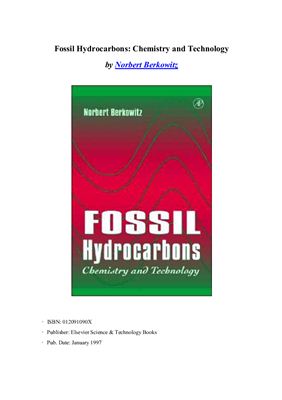Academic Press. 1997. 351p
Fossil hydrocarbons form a continuous series whose"heavy"members-heavy oils, bitumens, oil shale kerogens, and coal-are important sources of conventional lighter fuels. These hydrocarbons are much more abundant and easier to extract than natural gas and oil. This book discusses the origins and compositions of fossil hydrocarbons and shows how the"heavies"can be chemically transformed into environmentally clean gas, liquid transportation fuels, and an almost unlimited range of petrochemicals.
Dr. Berkowitz explodes the entrenched dichotomy between"petroleum hydrocarbons"and coal that has shaped popular perceptions of energy, showing that it is feasible to develop new technologies that capitalize on the availability of"synthetic"natural gas and light oils.
Fossil Hydrocarbons: Chemistry and Technology is a comprehensive treatment of fossil hydrocarbons, covering the source materials, biosources, metamorphic histories, geochemistry, classification, and molecular structure. It discusses the use of fossil hydrocarbons as a viable energy source in our future, detailing the preparation, processing and conversion technologies, as well as discussing the environmental issues that arise from production, processing, and use of various fossil hydrocarbons.
Key Features
* Approaches various fossil hydrocarbons as chemically related entities, thus dispelling the unwarranted distinctions between crude oils and coal
* Explains how heavy fossil hydrocarbons can be processed by much the same methods as crude oils for good economic and environmental purpose
* Illustrates how bitumens, oil shales, and coals are convertible into synthetic natural gas and oils
* Shows a path for reasonable energy self-sufficiency, through conversion of heavy hydrocarbons into synthetic natural gas and oils
* Augments each chapter with end-of-chapter notes and a detailed bibliography
* Provides more than 200 useful tables, schematics, and figures
Fossil hydrocarbons form a continuous series whose"heavy"members-heavy oils, bitumens, oil shale kerogens, and coal-are important sources of conventional lighter fuels. These hydrocarbons are much more abundant and easier to extract than natural gas and oil. This book discusses the origins and compositions of fossil hydrocarbons and shows how the"heavies"can be chemically transformed into environmentally clean gas, liquid transportation fuels, and an almost unlimited range of petrochemicals.
Dr. Berkowitz explodes the entrenched dichotomy between"petroleum hydrocarbons"and coal that has shaped popular perceptions of energy, showing that it is feasible to develop new technologies that capitalize on the availability of"synthetic"natural gas and light oils.
Fossil Hydrocarbons: Chemistry and Technology is a comprehensive treatment of fossil hydrocarbons, covering the source materials, biosources, metamorphic histories, geochemistry, classification, and molecular structure. It discusses the use of fossil hydrocarbons as a viable energy source in our future, detailing the preparation, processing and conversion technologies, as well as discussing the environmental issues that arise from production, processing, and use of various fossil hydrocarbons.
Key Features
* Approaches various fossil hydrocarbons as chemically related entities, thus dispelling the unwarranted distinctions between crude oils and coal
* Explains how heavy fossil hydrocarbons can be processed by much the same methods as crude oils for good economic and environmental purpose
* Illustrates how bitumens, oil shales, and coals are convertible into synthetic natural gas and oils
* Shows a path for reasonable energy self-sufficiency, through conversion of heavy hydrocarbons into synthetic natural gas and oils
* Augments each chapter with end-of-chapter notes and a detailed bibliography
* Provides more than 200 useful tables, schematics, and figures

